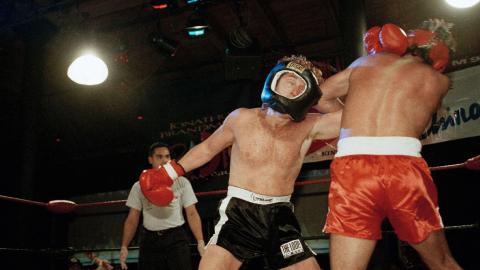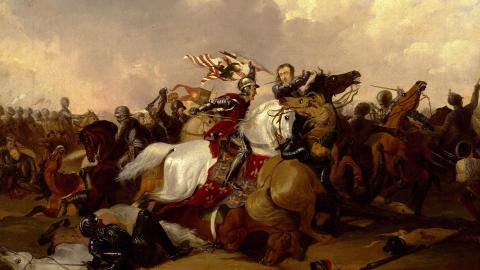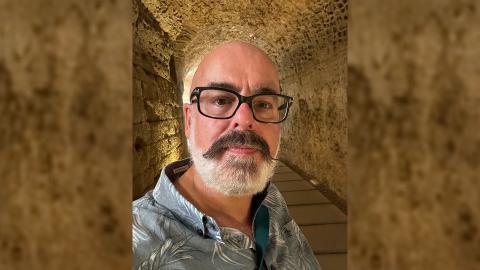Bill Clinton: Biography
The 42nd US president played the sax, hung out with celebs and became hugely popular despite the scandals.
Bill Clinton’s full name is William Jefferson Blythe III. The former President of the United States was named after his father, who was tragically killed in a road traffic accident just three months before Bill was born.
Whilst he was still a toddler, his mother travelled to Louisiana to study nursing, so that she would have a way of supporting herself and her baby son financially. When Bill was four-years-old, his mother married Roger Clinton, an automobile salesman from Hot Springs, Arksanas. Bill adopted his stepfather’s family name when he was a high school student.
Whilst Bill’s mother was away pursuing her studies, Bill was brought up by his grandparents, Eldridge and Edith Cassidy, who owned a small grocery store on the outskirts of Hope, their home town. Despite the segregation laws that were still in place at that time, Bill’s grandparents extended credit to all their customers, regardless of race, thus giving their grandson an early education in the value of justice and equality.
In 1953, When Bill was seven-years-old, the family moved to Hot Springs, Arkansas, an area renowned for its scenic beauty, and in 1956, Bill’s half-brother Roger Clinton Jr. was born.
In 1962, when Bill was a senior student in high school, he was chosen to go to Washington D.C., as a delegate for Boys Nation, a special youth leadership conference. The young men and women at the conference were all given the honour of meeting President John F. Kennedy in person, and Bill was one of the very first delegates to stand in line and shake the president’s hand. The meeting made a huge impression on Bill, and turned out to be a major turning-point in his life. He returned to Arkansas with a brand-new ambition: to serve the people of America by becoming president himself one day.
The 1960s were an eventful time in American history, and the civil rights movement was gathering momentum. In 1962, Martin Luther King made his groundbreaking “I have a dream” speech at the Lincoln Memorial in Washington. The young Clinton was deeply stirred and inspired by Martin Luther King’s speech - so much so that he memorised it!
Bill Clinton was a keen college student, and he also worked hard in his spare time, raising money for charity. His favourite hobby was reading, and he was particularly fond of The Last of The Mohicans, The Robe and Black Beauty. He also took up the saxophone, and became such a skilled player that at one time he even considered taking up a musical career. Each summer he attended a music camp in the Ozark Mountains, and he soon became the top player in the state band’s saxophone section.
As Bill worked so hard at school, he won many academic and music scholarships, and these enabled him to realise his dream of going to college. He chose to go to Georgetown University in Washington D.C, not least because it offered a good foreign service programme, and he also relished the prospect of becoming a student in a city that was also the political heart of the nation.
Bill graduated from Georgetown with a Bachelor of Science degree in International Affairs, and also worked as an intern in the office of Arkansas senator, J. William Fulbright. This gave him an invaluable insight into the workings of government, as well as what it would be like to be a politician. In 1968, he won a Rhodes Scholarship to study government at Oxford University, and when he returned to the US, he enrolled to study law at Yale University.
During this period, he learned more about politics by campaigning for a Senate candidate in Connecticut, and he also met his future wife, Hillary Rodham, who was a graduate of Wellesley College and Yale Law School.
After graduating, Bill returned to Arkansas to teach law at the University of Arkansas in Fayetteville, and began to work towards his goal of running for political office. In 1974, he ran for Congress - unsuccessfully - against the Republican senator John Paul Hammerschmidt. Hillary Rodham joined him in Arkansas, and helped him with his campaign, as well as becoming a teacher at the same university. Bill and Hillary were married on 11th October, 1975 The couple had one daughter, Chelsea, in 1980.
Clinton was elected as Arkansas Attorney General in 1976, and he went on to become state governor in 1978, when he was only 32 - at the time, the youngest governor ever to be elected. Throughout his tenure he focused heavily on improving the state’s educational system. He campaigned to be re-elected for a second term in office, but narrowly lost the race to Republican Frank White. Undeterred, he stood again as the Democratic candidate in the next election, and was re-elected in November 1982. Once again, he focused on improving education: he raised teachers’ salaries, and sought to improve the standards of education throughout the state.
By 1991, Bill Clinton decided that it was time to take up the challenge of running for presidential office. The national was languishing in economic recession, and Clinton aspired to bolster the economy and create new jobs, as well as continuing to pursue his drive to improve educational standards overall.
Clinton enlisted Senator Al Gore of Tennessee to be his vice-presidential running partner. They set out by bus on a speaking tour of America, going out to meet the people and hear their views at every opportunity. Their campaigning platform was based around the concept of “putting people first”, and also focused on the ideals of the American Dream, restoring economic well-being to the nation, and improving the prospects for children nationwide, regardless of their circumstances.
The presidential date was set for 3 November 1992, and voters turned out in their millions to set new records at the ballot box. Bill Clinton was elected as the 42nd president of the US, and Al Gore became the 45th vice-president. The presidency of Bill Clinton ushered in a whole new generation in American politics. For the first time in 12 years, both the White House and Congress were held by the same party. But the Democratic stronghold was short-lived, and by 1994, the Republicans had recaptured both houses of Congress.
As well as his reformist approach to domestic issues, such as education and healthcare, Clinton’s presidency was characterised by several key developments in foreign policy. He successfully dispatched peace-keeping forces to the battlefields of Bosnia, and became a highly vocal proponent for expanding the role and scope of Nato.
Clinton succeeded in negotiating the Oslo Accords, a treaty between Israel and the Palestine Liberation Organization (PLO), an achievement of which he was justly proud. He also negotiated the Nuclear Accords with North Korea, but the latter subsequently violated this agreement by carrying out continuing research into nuclear weapons. Bill Clinton also launched a major worldwide campaign against drug trafficking. He took a firm stand against Saddam Hussein, and bombed Iraq when Hussein stopped allowing the US to test for evidence of nuclear, chemical and biological weapons. Clinton has also been reported as saying that he regards his lack of response to the Rwandan genocide of 1994 as his greatest foreign policy failure.
Like his childhood idol, John F. Kennedy, Clinton was a highly popular, charismatic president and drew huge crowds whenever he travelled abroad advocating democratic freedom, as in his visits to Russian, Africa, China, Europe and South America.
In 1996, the successful Clinton-Gore partnership ran for re-election, and on 5 November that same year, Bill Clinton was re-elected to serve a second term as President of the United States. He was soon to encounter major scandals involving his personal life and reputation. In 1998, Bill Clinton became the second ever president to be impeached whilst in office, as a result of mounting concern over alleged personal indiscretions that he was said to have committed with a young female White House intern, Monica Lewinsky.
He was summoned to appear before the House of Representatives, and was tried in the Senate and found not guilty of the charges that had been brought against him. Astonishingly, Bill Clinton’s reputation appeared to survive this scandal remarkably well and he continued to receive unprecedented popularity ratings.
One of his most stirring challenges occurred around the time of the millennium, when he called upon the nation to put an end of racial discrimination once and for all, when he set up the William J Clinton Foundation.
The main aim of the foundation is to alleviate poverty, strengthen economies, improve health and protect the environment around the globe.
Clinton was an outspoken opponent to military action in Iraq, stating that it would have unwelcome consequences in 2002 and speaking out against Bush's administration in 2005.
In 2004, he released 'My Life', an autobiography that became a best-seller. In September, he underwent quadruple bypass surgery, followed by an operation for a partially collapsed lung in March 2005. He has since become a vegan for health reasons.
In 2005, he was appointed to head a relief effort for both the Asian tsunami and Hurricane Katrina. He set up the Bush-Clinton Tsunami Fund in January of that year. Clinton appeared in a pre-game show for the Super Bowl with George Bush Senior as well as travelling to affected areas with the elder Bush.
During 2008, Clinton actively campaigned for his wife Hilary to become the Democratic Party presidential candidate - a role some said he was too active in. Barack Obama won the primaries.
Clinton travelled to North Korea in 2009 on the behalf of two American journalists who had been imprisoned. He negotiated their release.
Since 2010, Clinton has visited Haiti which was hit by an earthquake in that year. He was also chosen by Obama to raise funds for the country with George W Bush Senior.
Clinton was the first Democratic president since Franklin D Roosevelt to win a second term in office, and during his presidency, the United States enjoyed one of the most peaceful and prosperous periods in its history.
Unemployment fell to record low levels, as did the rate of inflation. The climate of economic stability enabled more US citizens than ever to buy their own homes during Clinton's presidency.
Clinton also sought to restrict sales of handguns, as crime rates also fell in certain parts of the country. He proposed the first balanced budget to be recorded in several decades, and also succeeded in achieving a budget surplus.
















